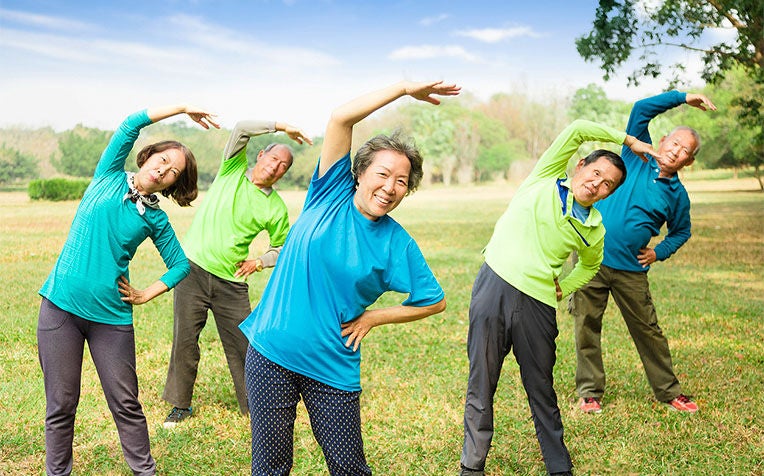
Healthy ageing involves keeping both the body and mind healthy and active.
It isn't just about living longer, it is about being able to enjoy quality of life longer too.
By 2030, a quarter of Singapore residents will be aged 65 years and above. Common fears of ageing include:
Losing independence,
Deteriorating health and
Loneliness
“These happen to be the effects of frailty,” shared Dr Alexis Ang, Senior Consultant from the
Department of Geriatric Medicine at Changi General Hospital (CGH), a member of the
SingHealth group.
“Frailty involves a gradual decline and reduction of our body functions, which increases our vulnerability to stressors and in turn can lead to a poorer quality of life,” she added.
Frailty can result from the weakening of multiple body system functions, low physical activity, malnutrition and social isolation.
Seniors who are frail are more prone to increased risks of falls, dementia and delirium, face a higher risk of functional decline after illness or injury, and are more vulnerable to adverse health-related outcomes.
Age-related loss of skeletal muscle mass and the loss of muscle strength, also known as
sarcopenia, is also a risk factor that can lead to frailty.
However, “Frailty can be prevented, reversed or delayed in the early stages and managed in the later stages,” Dr Ang advised.
4 Key factors for healthy ageing
1. Make healthy lifestyle choices
Stop smoking if you haven't. Quitting smoking lowers the risk of various cancers and chronic obstructive pulmonary disease (COPD).
Moderate your alcohol intake. Excessive alcohol consumption increases the risk of high blood pressure (hypertension) and liver diseases.
Practise safe daily behaviours. This includes wearing protective helmets during higher-risk activities such as cycling, applying good sun protection when outdoors to reduce the risk of skin cancer, wearing sunglasses to protect your eyes from cataracts, and wearing ear plugs to protect your ears from excessive noise that can induce hearing loss.
Have seven to eight hours of sleep per night. Lack of sleep can cause poor coordination and judgement, which can result in injuries and falls.
2. Pay close attention to your nutrition
Ageing brings about a change in nutritional requirements — there is a decreased need for calories, but an increased need for certain macro-nutrients such as proteins, carbohydrates or fats, and micro-nutrients like vitamins and minerals.
While age-related factors — such as poorer digestion, lower levels of sensory perception (taste, smell and sight), dental issues and swallowing problems — can affect the amount and type of food a senior consumes, it is important to have a healthy diet.
Benefits of a healthy diet for the elderly
Provides you with the nutrients required for energy and mobility
Reduces the risk of chronic disease such as diabetes, heart disease and stroke
Reduces the risk of malnutrition and sarcopenia (loss of skeletal muscle mass and strength)
Helps you achieve or maintain a healthy body mass index (BMI)
Helps with your mental health
3. Engage in regular, physical activities
Growing old is often accompanied with increased inactivity, but physical activities can help to improve endurance, strength and flexibility, maintaining our ability to walk and be independent. It can also improve our overall mood and even increase life expectancy. Exercise also helps to reduce the risk of developing anxiety, depression and dementia.
150 to 300 minutes of moderate-intensity physical activity is recommended per week.
One simple way to tell if an activity is of moderate intensity is the “talk test” — when you can still speak but are unable to sing while performing the activity. If you are unable to talk at all, it is considered a high-intensity exercise.
While many seniors might be afraid to start exercising due to fears of falling, a lack of self-belief, or social or environmental circumstances, you can start with simple activities such as brisk walking or gardening. Over time, build the activity into a daily routine.

4. Maintain social connections
Certain behaviours can be adopted based on your circle of friends and family — for example, the tendency to eat and exercise together. Studies also found that the larger your social circle, the more likely you are to lead a healthier lifestyle.
Having social ties such as a partner, family, friends, neighbours, co-workers, clubs or religious groups can help improve your mental health and psychological well-being. These relationships help foster a sense of self-worth and purpose, which can help decrease the risk of mortality.
Social relationships can also help improve your immune system. A lower number of social contacts results in higher levels of stress hormones. Loneliness can also increase stress levels and impact the immune system adversely.
This article was adapted from CGH's
Caring magazine (Issue 6).
Ref: H24
Check out other articles on healthy ageing:
5 Ways Seniors Can Stay Healthy
7 Common Ageing Problems Faced by Seniors
Must-Know Nutrition and Diet Tips for Seniors

















 Get it on Google Play
Get it on Google Play